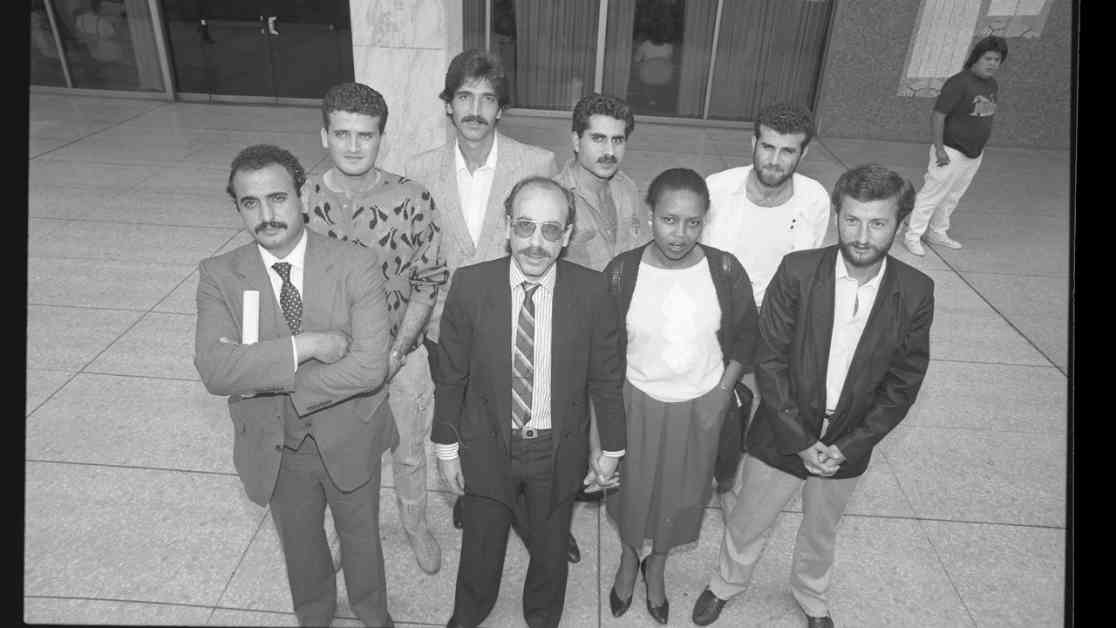In the bustling city of Los Angeles nearly four decades ago, a group of eight young immigrants found themselves at the center of a legal battle that would challenge the very foundations of free speech and activism in the United States. This eclectic group consisted of seven Palestinian men and the Kenyan wife of one of them, all of whom were deeply involved in pro-Palestinian activism. These individuals, most of whom were students, faced deportation charges stemming from their alleged association with a group that espoused communist ideologies—an accusation harking back to the Cold War era and the McCarran-Walter Act of 1952.
Amidst the political turmoil of the 1980s, I, a seasoned attorney with a penchant for defending cases involving communist allegations, agreed to join the legal team representing this group, later dubbed the L.A. Eight. My decision was shaped by a previous experience defending the acclaimed writer Margaret Randall, whose citizenship status had been called into question due to her writings advocating communism. Despite facing deportation, Randall emerged victorious in her legal battle, setting the stage for the impending fight on behalf of the L.A. Eight.
The arrests of the L.A. Eight were the culmination of a lengthy three-year investigation by the F.B.I., triggered by concerns over potential terrorist threats leading up to the 1984 Olympics in Los Angeles. The F.B.I. closely monitored the activities of the Palestinian activists, attending their events, documenting their literature, and even sending an undercover agent to observe a community dinner organized by the group. Despite finding no evidence of criminal wrongdoing or terrorist ties, the F.B.I. recommended deportation based on the group’s anti-Israel and anti-Reagan sentiments, singling out Khader Musa Hamide as a key figure due to his notable leadership qualities.
As legal proceedings unfolded, we embarked on a constitutional challenge against the deportation provision rooted in the doctrines of world Communism. Our efforts culminated in a landmark 1989 federal court ruling that deemed the provision unconstitutional, citing First Amendment protections that extend to all individuals within the United States, regardless of citizenship status. This pivotal decision marked a turning point in the legal landscape, prompting Congress to repeal the controversial deportation provision targeting the L.A. Eight.
However, the legal saga continued as new challenges emerged on the horizon. Congress enacted legislation allowing for the deportation of individuals providing “material support” to terrorist organizations, leading to a prolonged legal battle for the L.A. Eight. Despite facing setbacks and selective enforcement claims, the group persevered, buoyed by the unwavering belief in the fundamental right to free speech and association.
Fast forward to the present day, where echoes of the past reverberate in the case of Mahmoud Khalil, a recent Columbia graduate student facing deportation over his involvement in pro-Palestine protests. Drawing striking parallels to the plight of the L.A. Eight, Khalil finds himself entangled in a legal quagmire over his constitutionally protected right to protest and engage in political activism. The current administration’s attempts to silence dissent and stifle free speech under the guise of national security concerns have sparked a renewed debate on the limits of executive authority and individual liberties.
In a society built on the foundational principles of free expression and dissent, the case of the L.A. Eight serves as a poignant reminder of the enduring struggle to safeguard these fundamental rights. As we navigate the complex legal terrain of immigration law and national security interests, we are called upon to uphold the core values that define our democracy and protect the voices of all who seek to challenge the status quo. The quest for justice and equality continues, weaving a tapestry of resilience, courage, and unwavering determination in the face of adversity.












